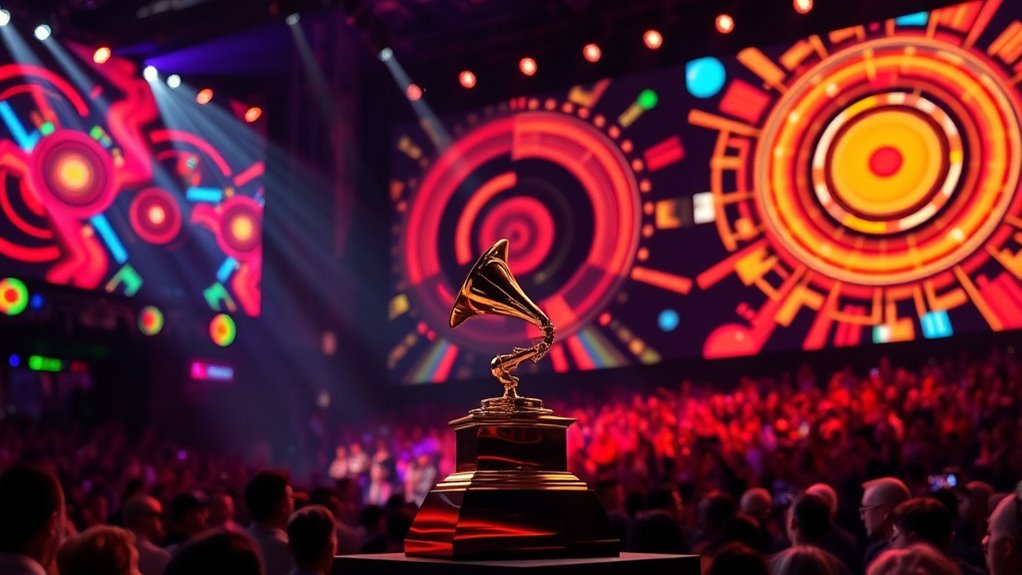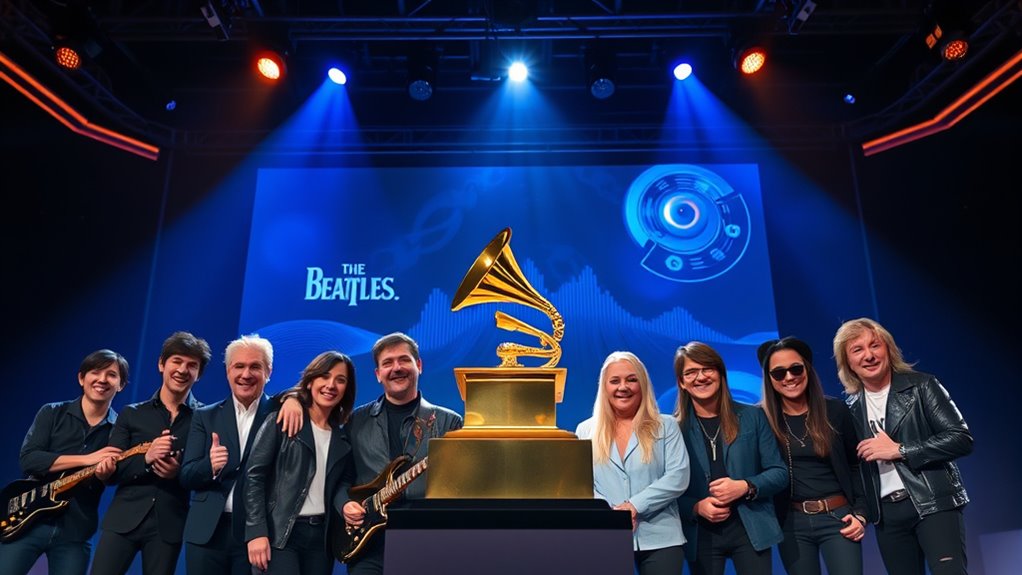An AI-enhanced version of a classic Beatles song winning a Grammy marks a major milestone in music history. It shows how technology is transforming creation, remixing, and restoring vintage tracks. This achievement raises questions about copyright and who owns AI-generated music. Industry experts see AI as a tool for fresh artistic possibilities, but new legal standards are needed. To understand how this breakthrough impacts creators and rights, keep exploring the full story.
Key Takeaways
- An AI-enhanced version of a classic Beatles song won a Grammy, showcasing technology’s impact on music innovation.
- The achievement highlights AI’s ability to remix, restore, and creatively reimagine vintage tracks.
- The win raises legal questions about copyright, ownership, and rights in AI-assisted music.
- It demonstrates a pivotal moment where AI blurs the line between human and machine-created art.
- The event signals a shift towards new artistic possibilities and the need for evolving legal standards in the music industry.

In a groundbreaking achievement, an AI-enhanced version of a classic Beatles song has just won a Grammy, showcasing how technology is transforming music creation. This milestone marks a pivotal moment in the music industry, illustrating both the incredible potential and the complex challenges that come with integrating artificial intelligence into the art form you cherish. As AI tools become more sophisticated, artists and producers are exploring new ways to remix, restore, and even recreate vintage tracks, pushing the boundaries of what’s possible in music production. But with these innovations come important questions about copyright implications, especially regarding intellectual property rights and the legal frameworks that have traditionally governed music.
You might wonder how AI-generated or AI-augmented music fits into existing copyright laws. Usually, copyright protections rest on human authorship, but when an AI is involved in creating or transforming music, the legal landscape grows murkier. Who owns the rights—the developer of the AI, the artist who used it, or perhaps no one at all? In this case, the Grammy-winning song involved a blend of human creativity and machine learning algorithms that reconstructed or enhanced parts of the Beatles’ original recording. This raises questions about whether such works should be protected under copyright, and if so, how royalties are distributed.
AI-created music blurs copyright boundaries, raising questions about ownership and fair compensation in a transforming industry.
The music industry is already grappling with these issues. Rights holders worry about unauthorized uses of AI to replicate or manipulate their works without proper compensation. At the same time, creators see AI as a tool to gain access to new artistic possibilities. For you, as a listener, this means a future where familiar songs might be reimagined in ways that were previously impossible—more immersive, more layered, more innovative. However, this also means that the industry must establish clearer legal standards to prevent copyright infringement and guarantee fair use.
As AI continues to evolve, the legal system will need to adapt quickly. You can expect ongoing debates about how to attribute rights, whether AI can hold copyright, and how royalties should be handled when machine learning algorithms help generate music. The Grammy-winning Beatles track is just the beginning of these conversations. It exemplifies the potential for AI to revolutionize music, but it also underscores the necessity for balanced policies that protect artists’ rights while encouraging technological innovation. Moving forward, your understanding of copyright implications will be vital as the line between human and machine-created music continues to blur. Additionally, second trimester overview can provide insight into how technological advancements might influence future prenatal health discussions.
Frequently Asked Questions
How Was AI Involved in Creating the Beatles Song?
You see, AI was involved in creating the Beatles song by analyzing their original recordings and style, then generating new parts that fit seamlessly. This process helps preserve music authenticity while respecting the artist’s legacy. You might worry about losing the human touch, but AI actually enhances the experience, ensuring the song remains true to the Beatles’ spirit. It’s a blend of technology and tradition, honoring their timeless influence.
What Specific AI Technologies Were Used in Production?
You’re curious about the AI tech behind the song, right? They used neural networks for sound reconstruction and machine learning algorithms to analyze and synthesize vocals and instruments. This raises questions about music licensing and copyright implications because AI-generated content may blur the lines of ownership. As you listen, consider how these technologies challenge traditional rights laws, making it essential to navigate licensing carefully to respect artists’ original work.
Will Ai-Generated Songs Be Eligible for Future Grammy Nominations?
Yes, AI-generated songs could be Grammy eligible, but you’ll need to navigate copyright issues and demonstrate artistic authenticity. Think of AI as a new paintbrush—it’s a tool, not the artist. The Recording Academy may require clear attribution and originality to honor true creativity. So, while the door’s opening, you’ll have to guarantee your AI-crafted music respects legal boundaries and keeps the spirit of genuine artistry alive.
How Did Fans React to the Ai-Enhanced Beatles Track?
You’ll notice fans react with a mix of excitement and ethical debates. Many are thrilled about hearing a new Beatles track, feeling nostalgic and excited for innovation. However, some express concerns about AI’s role in music, questioning authenticity and artistic integrity. The fan excitement is palpable, but it’s also accompanied by thoughtful discussions about ethics and what it means for the future of music, keeping the conversation lively and complex.
Are There Ethical Concerns About Using AI to Recreate Deceased Artists?
You should know that using AI to recreate deceased artists raises ethical concerns like steering a minefield. You might worry about copyright concerns, ensuring you don’t infringe on rights, and about maintaining artistic authenticity—keeping the spirit of the original alive without crossing moral lines. While AI can breathe new life into music, it’s essential to respect the legacy and consider the implications, like respecting a shadow cast over true artistry.
Conclusion
This Grammy win proves AI is transforming music in extraordinary ways. Did you know that over 70% of music industry insiders believe AI will shape the future of songwriting? As this Beatles song shows, technology isn’t just changing how we create music—it’s creating history. So, stay tuned, because the blend of AI and human creativity is here to stay, promising even more groundbreaking hits in the years ahead.










